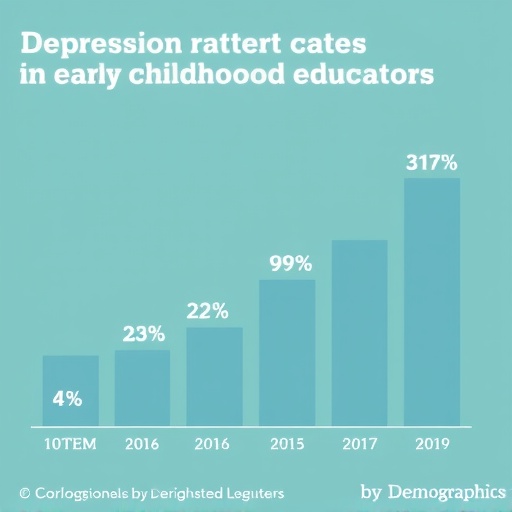The mental health of educators plays a pivotal role in shaping the quality of education, particularly in early childhood environments. Recent research conducted by Bates, Norrod, and Dynia sheds light on an urgent and growing concern: the prevalence of depression among center-based early childhood educators. This population has often been overlooked, but the findings underscore a critical intersection between mental health and educational effectiveness, raising alarms about the need for systemic change in how we support these invaluable professionals.
The research indicates that an alarming number of educators experience symptoms of depression, a mental health condition that skews the capacity of teachers to provide nurturing and attentive care. The study, which considers a range of sociodemographic characteristics, reveals profound disparities among different subgroups. These findings are not merely statistics; they reflect the lived experiences of countless educators who dedicate their lives to fostering development in young children but may be silently struggling with their own mental health challenges.
Bates and his co-authors emphasize the importance of recognizing these mental health challenges within the context of early childhood education. This educational phase is critical, as it lays the foundation for lifelong learning and development. When educators face depression, the impact extends beyond their own well-being; it resonates throughout the classroom and can hinder the developmental milestones of the children they educate. This connection highlights an urgent need for a supportive infrastructure that addresses mental health comprehensively and effectively.
Demographic factors also play a significant role in the prevalence of depression among educators. The research presents a nuanced view, indicating that certain groups face higher rates of mental health concerns. For instance, educators from minority backgrounds or those working in low-income settings are disproportionately affected. This raises questions about equity and access to mental health resources in the field of education, which must be addressed to foster environments where both educators and children can thrive.
In light of these findings, it becomes imperative for education policymakers and stakeholders to prioritize mental health support. This might include implementing regular mental health screenings, providing access to counseling services, and fostering a culture of openness where educators feel safe discussing their mental health needs. By normalizing these conversations and resources, schools can help dismantle stigma and contribute to a healthier work environment for educators.
Moreover, professional development programs should integrate mental health awareness into their training. Educators must be equipped not only with pedagogical skills but also with strategies to cope with the emotional demands of their profession. Enhanced training can empower educators, allowing them to manage stress more effectively and implement self-care practices. Consequently, these initiatives can lead to increased job satisfaction, which in turn enhances the educational experiences of students.
The study’s implications extend into the wider community that supports early childhood education. Families, administrators, and mental health professionals must come together to advocate for comprehensive mental health resources. Collaboration can lead to the development of support networks that empower educators to seek help without fear of repercussion, ultimately fostering a healthier teaching landscape.
It’s essential for researchers to continue exploring this area, as the current findings represent only the beginning of understanding the complexities of mental health in education. Future studies should further dissect the specific challenges faced by early childhood educators and propose tailored interventions. These research endeavors can illuminate the many facets of mental health that educators experience and guide effective solutions.
In addition to institutional support, there is also a critical need for community engagement. Schools should capitalize on community resources, partnering with local organizations that focus on mental health awareness and education. Such collaborative efforts can multiply the support systems available to educators. Similarly, raising community awareness about the importance of mental health in education can foster a more supportive environment for both educators and children.
Finally, while the focus on depression in early childhood educators is vital, it is equally important to shine a light on the successes and resilience of those in the field. Celebrating the achievements of educators who have navigated these challenges can inspire others, forging a pathway of hope and strength amid adversity. By sharing these success stories, we can craft a narrative that emphasizes the importance of mental health while showcasing the transformative power of education.
As the research by Bates, Norrod, and Dynia illustrates, mental health in early childhood education is a complex yet critical issue. There is an unwavering need for continual dialogue, research, and action to create an educational ecosystem that supports the mental well-being of educators. In addressing these challenges head-on, we can ensure that early childhood education remains a pillar of support for children’s development and learning, while simultaneously nurturing the individuals who dedicate their lives to this essential work.
Understanding the impact of mental health not only benefits educators but fundamentally enriches the educational experience of every child in their care. As we move forward, let us embrace a collaborative approach to mental wellness in early childhood education, shaping a future where the well-being of educators and students flourishes side by side.
Subject of Research: Mental health and depression prevalence among center-based early childhood educators.
Article Title: Prevalence of Depression in Center-based Early Childhood Educators by Sociodemographic Characteristics.
Article References:
Bates, R.A., Norrod, P. & Dynia, J.M. Prevalence of Depression in Center-based Early Childhood Educators by Sociodemographic Characteristics.
Early Childhood Educ J (2025). https://doi.org/10.1007/s10643-025-02012-8
Image Credits: AI Generated
DOI: 10.1007/s10643-025-02012-8
Keywords: early childhood educators, mental health, depression, sociodemographic characteristics, education policy, professional development.




